Eyewash!
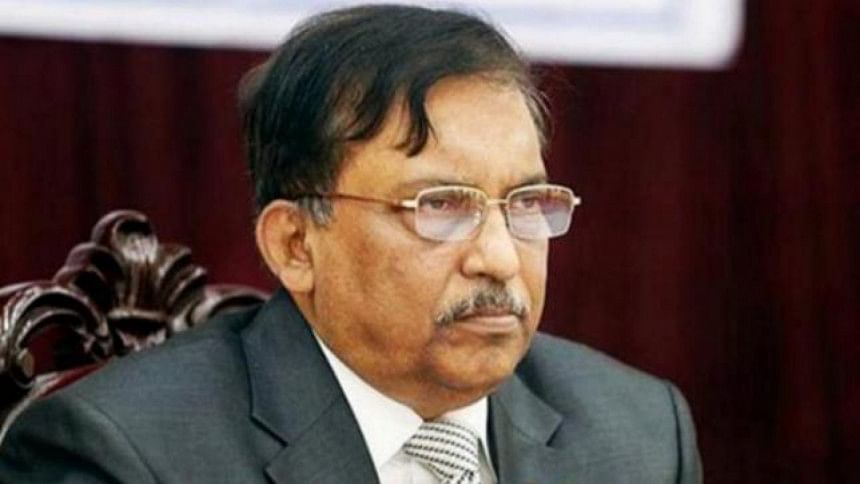
In a sudden move, Myanmar has taken back five Rohingyas from no man's land between Bangladesh and Myanmar, an event the international media has dubbed as the repatriation of first refugee family since the crisis began in August last year.
Shortly after welcoming the Rohingyas early yesterday, Myanmar government in a statement, posted on the official Facebook page of its Information Committee, said, “The five members of a family … came back to Taungpyoletwei town repatriation camp in Rakhine State this morning.”
Authorities determined “whether they were once living here” and provided the family with national verification cards, a form of ID that falls short of citizenship and has been rejected by Rohingya leaders who want full rights, reports AFP.
Photos posted alongside the statement showed one man, two women, a young girl and a boy receiving the ID cards and getting health checks. It said the family had been sent to stay “temporarily” with relatives in Maungdaw town.
It has been learnt that the five are Aktar Alam, his wife Sajeda Begum, daughter Tahera, son Tarek Aziz and neighbour Shawkat Ara.
After the move, Bangladesh Home Minister Asaduzzaman Khan said such an announcement was nothing but a farce, while rights activists and experts said the one-sided step by Myanmar is an eyewash and a public relations stunt.
The Rohingya family did not reach Bangladesh as they used to live in no man's land, added Asaduzzaman. "I hope Myanmar will repatriate all the refugee families within the shortest possible time," he told reporters after a meeting at the Dhaka Chamber of Commerce and Industry.
Some 700,000 Rohingyas have crossed over into Bangladesh since August and joined over 300,000 who had fled earlier waves of violence in Rakhine. At least 6,000 Rohingya families have been living in the no man's land since that month.
Bangladesh and Myanmar in November signed a bilateral deal for the repatriation. The UN high commissioner for refugees said on Friday that the conditions in Myanmar were not yet conducive to safe, voluntary and sustainable returns of the Rohingya.
Andrea Giorgetta of the International Federation for Human Rights (FIDH) told AFP that Myanmar's announcement of repatriation is "a public relations exercise in an attempt to deflect attention from the need for accountability for crimes committed in Rakhine State".
Asif Munier, an independent researcher on migration and refugee, said Myanmar's unilateral action and the efforts to manipulate the issue by portraying it as “repatriation” could undermine the bilateral deal signed in November.
Though the family lived in no man's land, there should have been an exchange of information between the two governments, but nothing of that sort happened. Even, the UN agencies or other international agencies that are providing humanitarian support to the Rohingyas in no man's land were not aware of it.
“Such an action is quite provocative,” Munier told The Daily Star.
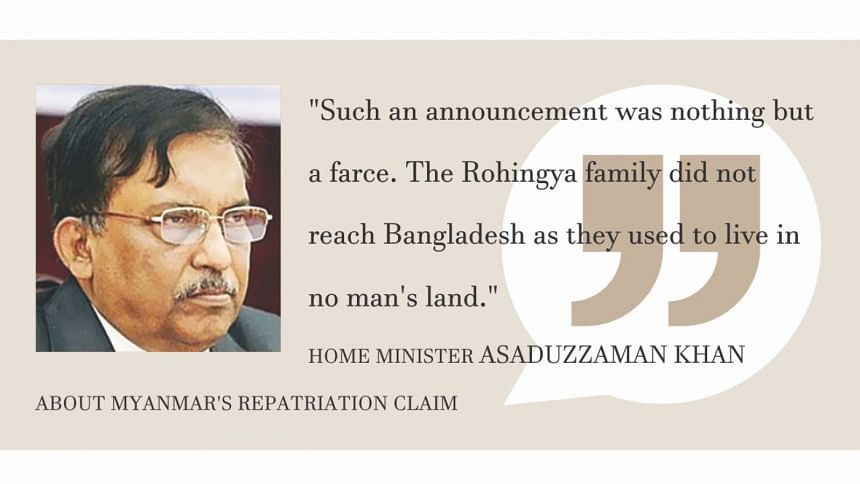
A foreign ministry official said, “There is no scope to call it repatriation … it's a total hoax because the family which the Myanmar authorities claimed to have been repatriated was not within the territory of Bangladesh.”
Talking to The Daily Star, the official categorically said the repatriation has not started at all. The Myanmar government has not finished verifying the first list of 8,032 Rohingyas handed over to Myanmar on February 16.
“How can they claim it to be repatriation since the Rohingya family was not taken back from the camps within Bangladesh. There is no way to call it repatriation … under no criteria it's repatriation … its nothing but a hoax.”
The foreign ministry is not ready to discuss it or take it into consideration because the issue is not related with the repatriation of the hundreds of thousands of Rohingyas who took shelter in Bangladesh after fleeing military crackdown in Rakhine State, the official said.
YET ANOTHER TRICK?
The Rohingyas, who have been denied citizenship and basic rights in Myanmar, have fled into Bangladesh in various waves since 1980s -- the latest being the largest and creating the fastest growing refugee crisis of the world.
Thousands of Rohingya villages were burnt, and according to the Doctors without Borders, some 6,700 Rohingya men and women were killed in one month since a brutal military crackdown began in late August.
Women were raped and Rohingya houses were looted.
The UN termed it ethnic cleansing and having hallmarks of genocide, creating global pressure on the Southeast Asian country.
Even after signing a bilateral repatriation deal in November, Myanmar authorities reportedly bulldozed the already burnt houses of the Rohingyas and set up security installations.
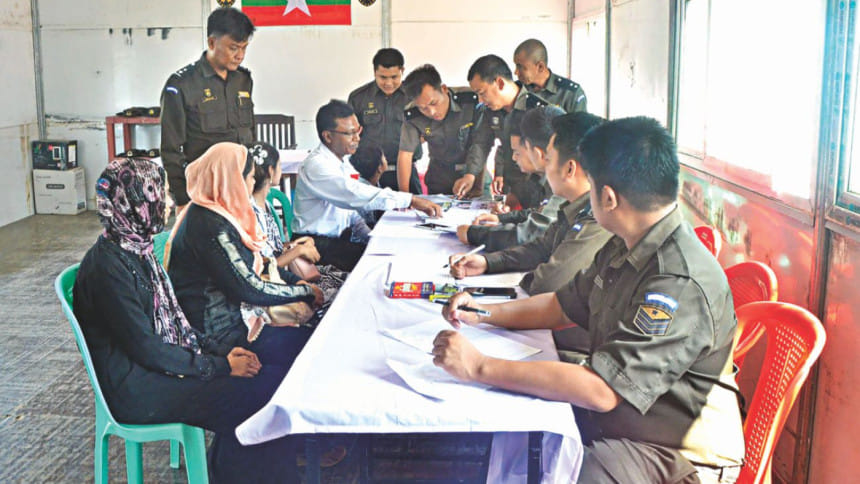
The repatriation was supposed to begin on January 23, but a week before the date, the Myanmar authorities demanded a family-wise list in their prescribed form, something Bangladesh needed time to prepare.
Still, Myanmar ministers were quick to blame Bangladesh as no repatriation took place in late January.
Then, Bangladesh handed over a list of 8,032 Rohingyas in mid-February, and Myanmar verified only some 700 of them. Again, Myanmar officials blamed Bangladesh for that, saying the forms were not properly filled up.
Asif Munier said Myanmar has time and again blamed Bangladesh when the latter is bearing the brunt of the Rohingya crisis, something the country is in no way responsible for.
Bangladesh should immediately issue a note of protest against such PR stunt by Myanmar, he added.
Munier also said Bangladesh has also signed a deal with the UNHCR on voluntary repatriation of the Rohingyas, while the UN Refugee Agency is negotiating another deal with Myanmar.
When things regarding repatriation keep moving, Myanmar's behaviour is suspicious, he said. “Such actions by Myanmar may threaten the bilateral repatriation.”

 For all latest news, follow The Daily Star's Google News channel.
For all latest news, follow The Daily Star's Google News channel. 



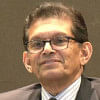

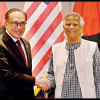


Comments